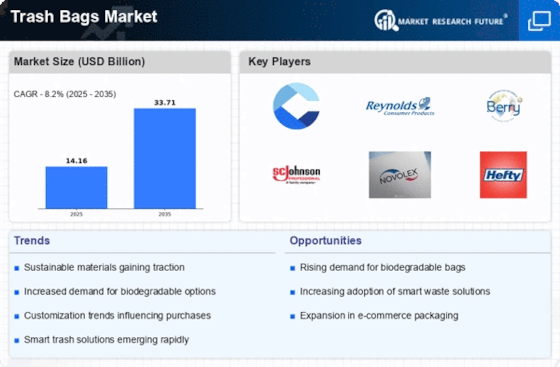Top Industry Leaders in the Trash Bags Market

Trash bags have become the unsung heroes of cleanliness, silently whisking away our daily discards. And behind this seemingly mundane product lies a vibrant market where global giants and nimble startups clash, driven by innovation, sustainability, and the ever-growing piles of our waste. Let's delve into the strategies, market drivers, industry news, and recent developments shaping this dynamic terrain.
Strategies Fueling the Fight:
-
Product Diversification: Leading players like Glad and Hefty are expanding their portfolios beyond traditional liners, venturing into specialty bags for pet waste, yard waste, and even composting. Catering to diverse needs is key to capturing new market segments. -
Sustainability Focus: Environmental concerns are pushing the development of eco-friendly bags made from recycled materials, plant-based options, and even seaweed composites. Companies like BioBag and Treo are leading the charge with innovative materials and responsible manufacturing practices. -
Technological Prowess: Innovation is king, with players like Glad innovating with puncture-resistant bags, odor-neutralizing technologies, and even integrated handles for improved convenience. Enhancing functionality and user experience drives market leadership. -
Regional Expansion: Asia Pacific, driven by booming populations and urbanization, offers immense potential. Companies are establishing local production facilities and distribution networks to capitalize on this regional surge.
Factors Dictating Market Share:
-
Bag Type: Drawstring bags dominate due to their ease of use and closure. However, star-sealed bags are preferred for heavy-duty applications and leak prevention. The choice of bag type influences market positioning and customer preference. -
Material Composition: Polyethylene remains the primary material due to its affordability and durability. However, the demand for eco-friendly alternatives like compostable and recycled materials is increasing, impacting material sourcing and brand perception. -
Size and Capacity: Matching bag size to waste generation minimizes waste and cost. Companies are offering diverse sizes and capacities, catering to individual and commercial needs, influencing market share amongst specific customer segments.
Key Players:
- Berry Global Inc., (US)
- The Clorox Company, (US)
- Novolex, (US)
- Reynolds Consumer Products, (US)
- Inteplast Group, Ltd., (US)
- Poly-America, L.P., (US)
- International Plastics, Inc., (US)
- Four Star Plastics, (US)
- Cosmoplast Industrial Company (L.L.C.) (UAE)
- NOVPLASTA, s.r.o., (Czechia)
- Alpha Omega Plastic Manufacturing L.L.C (UAE)
- ALUF Plastics (US)
- BioBag International AS (Norway)
- Complete Packaging & Shipping Supplies (US)
- Mapco (Pvt) Ltd (Canada)
- Polykar Industries Inc (Canada)
- The Clorox Company (US)
- Universal Plastic Bags (US)
Recent Developments:
July 2023: Glad unveils a new line of "LeakGuard Plus" bags featuring a revolutionary double-seal closure system for maximum leak protection, catering to heavier waste disposal needs.
September 2023: A startup company introduces a smart trash bag equipped with sensors that monitor waste levels and notify users when replacement is needed, aiming to optimize waste management and reduce unnecessary bag use.
November 2023: A breakthrough in biopolymer technology allows for the production of ultra-strong and compostable trash bags made from plant-based materials, providing a viable alternative to traditional polyethylene bags.
December 2023: Hefty partners with a leading recycling company to launch a pilot program for collecting and recycling used trash bags, closing the loop on the product lifecycle and promoting circular economy practices.
January 2024: A team of researchers develops a self-sealing trash bag that automatically closes upon reaching fullness, minimizing odor and preventing spillage, offering improved hygiene and convenience










